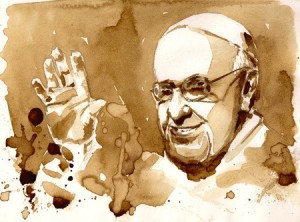 I suppose it was only a matter of time before someone applied the fast food concept to religion. Well, that someone turned out to be New Mexico Archbishop John C. Wester, whose concern about Covid19 led him to order all priests in his diocese to limit the length of their sermons to a maximum length of three minutes. He later increased the time to five minutes. Then, when he learned that some priests were ignoring even what he considered the more generous time limit, he had his office issue this statement, quoted in Pulpit and Pen:
I suppose it was only a matter of time before someone applied the fast food concept to religion. Well, that someone turned out to be New Mexico Archbishop John C. Wester, whose concern about Covid19 led him to order all priests in his diocese to limit the length of their sermons to a maximum length of three minutes. He later increased the time to five minutes. Then, when he learned that some priests were ignoring even what he considered the more generous time limit, he had his office issue this statement, quoted in Pulpit and Pen:
“We’ve received reports of some sermons going on for well over the five-minute limit set by the Archbishop. This not only increases exposure time to others, but increases the discomfiture [sic] of some congregants, to the point of some not attending Mass because of it. If such long homilies continue, the AB [Archbishop] will consider severer actions for subject clergy, up to and including possible suspension of the faculty to preach.” [Emphasis added]
It was unclear how the 3 or 5 minute limit was arrived at. Did the Archbishop decide that homilists tend to spray saliva farther from the pulpit after five minutes? Or that parishioners’ immune systems relax to a dangerous degree beyond that limit? But what he clearly should have pondered is the impact his sanctions would have. Given the present shortage of priests, even a modest number of suspensions could limit the number of Masses offered in the diocese.
At first I found this story foolish. It is eminently reasonable to safeguard parishioners by emptying the holy water fonts, limiting the number attending any given Mass, enforcing social distancing in the pews, and requiring congregants to wear masks (except when receiving the Eucharist). But one has to torture logic unmercifully to conclude that sharply reducing the length of sermons offers protection from the virus.
Looking more closely at the Archbishop’s thinking about the laity, I found the story more troubling than foolish. He suggested that longer sermons increase parishioners’ discomfort even to the point that they stop attending Mass, implying that it is fear of the virus that underlies their discomfort. I believe their discomfort is more likely over the content of the sermons than their length—more specifically, the avoidance of important moral issues in sermons, as I pointed out in a recent essay. Six Sermons I’d Like to Hear.
Father Frank Pavone of Priests for Life took a similar position recently in an open letter to U.S. Bishops. It concluded as follows: “Never has the voice of the Church been more needed; everything we stand for and have fought for is on the line….We just would rather not feel like we’re fighting without our leaders or, worse, having our leaders fight against us.”
The danger posed by Covid19 is certainly worthy of the clergy’s concern, but they must not allow that concern to distract their attention from the existential threats facing the Church, Democratic institutions in the U.S. and around the world, and our very civilization. Instead of demanding that his priests give shortersermons, Archbishop Wester should be demanding that they give more powerful sermons that shine the light of the Gospel on the forms of darkness that are enveloping us—Secularism, Socialism, and Communism. And his fellow bishops in this country and around the world should do the same. The goal should be to provide not faster but better spiritual nourishment.
Copyright © 2020 by Vincent Ryan Ruggiero. All rights reserved



